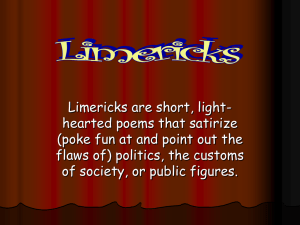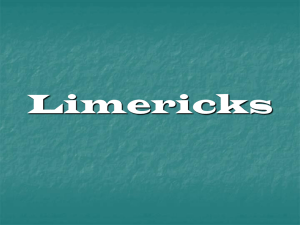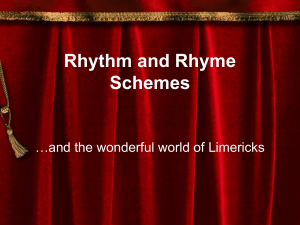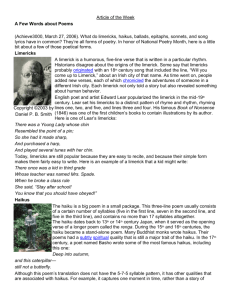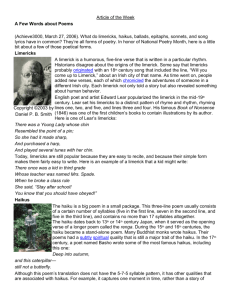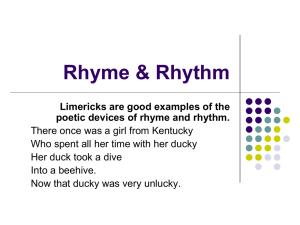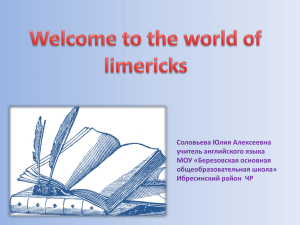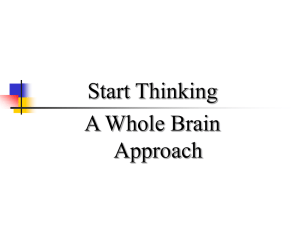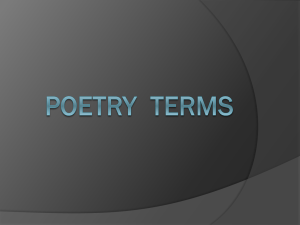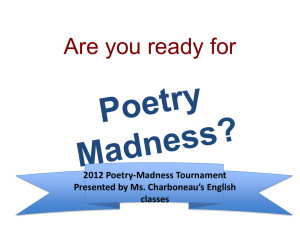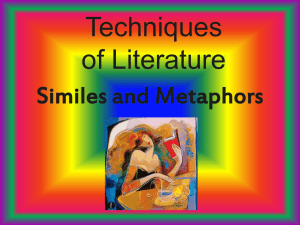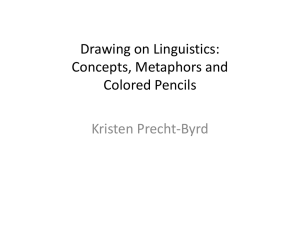Michael Rossi Metaphors and Rhyme Time Constraints: 45 minutes
advertisement
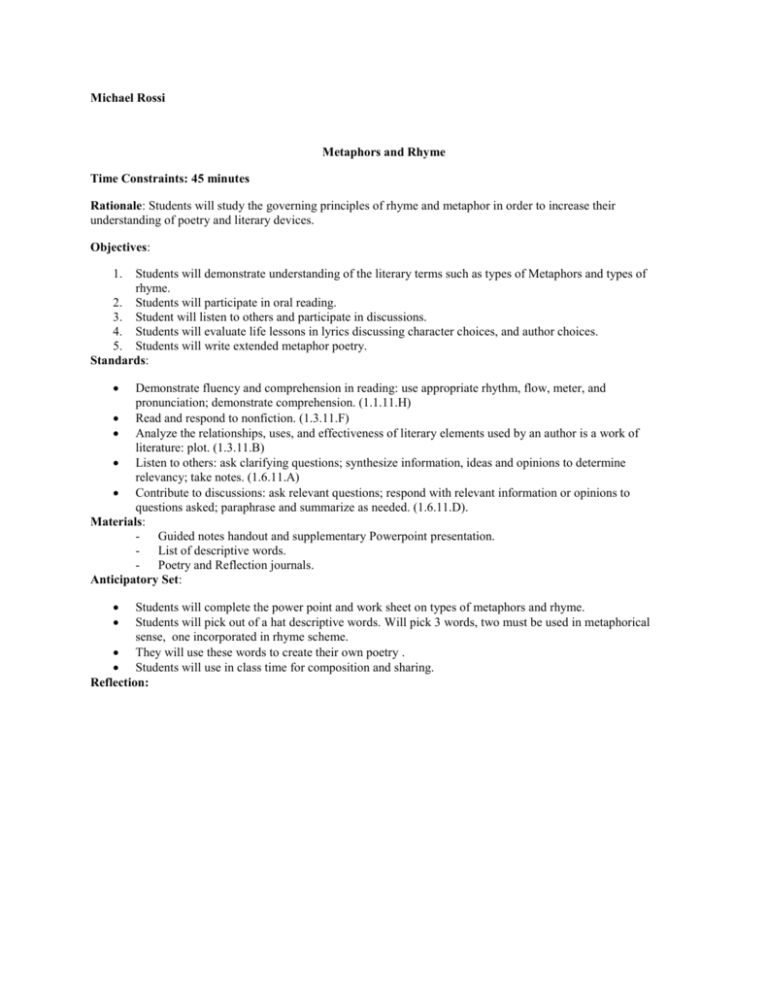
Michael Rossi Metaphors and Rhyme Time Constraints: 45 minutes Rationale: Students will study the governing principles of rhyme and metaphor in order to increase their understanding of poetry and literary devices. Objectives: 1. Students will demonstrate understanding of the literary terms such as types of Metaphors and types of rhyme. 2. Students will participate in oral reading. 3. Student will listen to others and participate in discussions. 4. Students will evaluate life lessons in lyrics discussing character choices, and author choices. 5. Students will write extended metaphor poetry. Standards: Demonstrate fluency and comprehension in reading: use appropriate rhythm, flow, meter, and pronunciation; demonstrate comprehension. (1.1.11.H) Read and respond to nonfiction. (1.3.11.F) Analyze the relationships, uses, and effectiveness of literary elements used by an author is a work of literature: plot. (1.3.11.B) Listen to others: ask clarifying questions; synthesize information, ideas and opinions to determine relevancy; take notes. (1.6.11.A) Contribute to discussions: ask relevant questions; respond with relevant information or opinions to questions asked; paraphrase and summarize as needed. (1.6.11.D). Materials: - Guided notes handout and supplementary Powerpoint presentation. - List of descriptive words. - Poetry and Reflection journals. Anticipatory Set: Students will complete the power point and work sheet on types of metaphors and rhyme. Students will pick out of a hat descriptive words. Will pick 3 words, two must be used in metaphorical sense, one incorporated in rhyme scheme. They will use these words to create their own poetry . Students will use in class time for composition and sharing. Reflection: Metaphors Extended Metaphor: _________________________________________________________________________________ _________________________________________________________________________________ ________________________________________________________________________ Examples: Love is a 10 speed bike that is colorful, powerful and sleek. It can sweep you along at a dizzying pace or change gears to climb a difficult hill. If you don’t take care of it, it can rust from misuse or the brakes can seize, but with regular maintenance, it can be the best way to glide through the many phases of life. What is the extended metaphor: __________________________________________________ Truth is a rainstorm that lights up the sky, crashes through the atmosphere and washes us clean. No matter how strong the shelters we create, truth can charge through our defenses and leave us exposed to the elements. What is the extended metaphor: __________________________________________________ Mixed Metaphor: _________________________________________________________________________________ ___________________________________________________________________________ Example: "If we can hit that bullseye then the rest of the dominoes will fall like a house of cards... Checkmate." Quote from Futurama TV show character Zapp Brannigan. Implied Metaphor: _________________________________________________________________________________ ___________________________________________________________________________ Example: John swelled and ruffled his feathers (versus John was a peacock) Direct Metaphor: ______________________________________________________________________________ ______________________________________________________________________________ Example: John is a peacock (versus John swelled and ruffled his feathers) Family Love Hate School Person Home Fear Hope Ocean Dark Fog Light Stage Life Butterfly Rainbow Candle Roller Coaster Blanket Hungry Dog Monster Tree World A Box of Chocolates Rocket Football Road Sugar Rain Refrigerator Michael Rossi Limericks and Haikus Time Constraints: (2) 45 minute periods Rationale: Students will understand the governing principles of limericks and haikus in order to decipher and understand poetic structure and history. Objectives: Students will understand what Limericks and Haikus are and the elements of each type. Students will demonstrate knowledge through question and answer seminar. Students will participate in discussion and listen to peers. Standards: Analyze the relationships, uses and effectiveness of literary elements used by one author including irony, plot, theme, structure. (1.3.11.B) Listen to others. (1.6.11.A) Ask clarifying questions. Synthesize information, ideas, and opinions to determine relevancy. Take notes. Contribute to discussions. (1.6.11.D) Ask relevant, clarifying questions. Respond with relevant information or opinions to questions asked. Listen to and acknowledge the contributions of others. Adjust tone and involvement to encourage equitable participation. Introduce relevant, facilitating information, ideas, and opinions to enrich the discussion. Paraphrase and summarize as needed. Materials: - Guided notes on limericks and haikus - Poetry and Reflection journals Anticipatory Set: Guided notes, see attached. Students will complete notes and read examples. Procedures and Assessment: Day One: - Students will then construct their own Limerick and Haiku. They will choose one to share with the class (HW). Day Two: - Students will get into a square around the room. Using clapping or snapping to keep our beat, students will present their limericks. - They will then attempt to memorize a Limerick Memory Aid to remember the parts for Limericks. - Closure: Q&A Reflection: Limericks and Haikus Limericks: A ______________ line nonsense poem. The word derives from the ___________________ town of Limerick. Apparently a pub song or tavern chorus based on the refrain "Will you come up to Limerick?" where, of course, such bawdy songs or 'Limericks' were sung. Lines 1, 2, and 5 of Limericks have ____________ to ten syllables and rhyme with one another. Lines 3 and 4 of Limericks have _____________ to seven syllables and also rhyme with each other. All Limericks have the rhyme scheme ____________________. Limerick 1 By: Edward Lear There was an Old Man with a beard, Who said, 'It is just as I feared! Two Owls and a Hen, Four Larks and a Wren, Have all built their nests in my beard! Limerick 2 An exceedingly hungry friend of mine, When asked at what hour he'd dine, He replied, "At eleven, At three, five, and seven, And eight and a quarter past nine. Limerick 3 Fate has just pulled in it’s feelers To turn events over to dealers Who’ll work out the spread For the big game ahead, The Super Bowl – Packers and Steelers. Haikus: A __________________________ poem with ___________________ lines. Line one and three have ___________ syllables Line two has ___________________ syllables. They are usually written about _______________________. Haiku 1 I walk across sand And find myself blistering In the hot, hot heat Haiku 2 Football Like medieval knights Armor clad, in fields battle To reap victory
